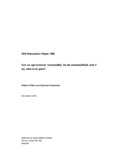| dc.contributor.author | Fitter, Robert | |
| dc.contributor.author | Kaplinsky, Raphael | |
| dc.date.accessioned | 2018-07-03T09:21:44Z | |
| dc.date.available | 2018-07-03T09:21:44Z | |
| dc.date.issued | 2002-01-25 | |
| dc.identifier.citation | Fitter, R. and Kaplinsky, R. (2002) Can an Agricultural "Commodity" be De-Commodified, and if so, Who is to Gain? IDS Discussion Paper 380, Brighton: IDS | en |
| dc.identifier.isbn | 1 85864 398 8 | |
| dc.identifier.uri | https://opendocs.ids.ac.uk/opendocs/handle/20.500.12413/13851 | |
| dc.description.abstract | The weakness of redistributional mechanisms, both globally and within developing economies, makes it imperative to directly enhance the productive incomes of poor people. Coffee farmers, generally located in the poorest countries, have suffered especially badly in recent years, and farm gate and internationally traded bean prices are now at historically low levels. At the same time, though, global coffee consumers are becoming more discerning. With at least as much potential taste variety as in the case of wine, final product prices are becoming more differentiated. Margins for some coffees can therefore be expected to increase significantly as consumers become more discriminating in their tastes. But who is to gain from these more differentiated prices? Analysis shows that whilst the price spread is growing in global trading markets, it is simultaneously narrowing at the farm gate. At the same time, the destruction of coffee marketing boards (largely as a result of Structural Adjustment Programmes) has had unintended effects: instead of their margins accruing to farmers, almost all of these margins are being absorbed in the high-income importing countries. Thus, left to market forces, the likelihood is that farmers will gain little from increasingly discriminating final consumer tastes. Instead it is the global branders and the supermarket chains who are likely to appropriate these growing product rents. However, if consumers can be educated to recognise that better coffees are directly linked to their place of origin rather than to their brand names, a more equal global distribution of income is likely to emerge in this value chain. This paper ends with a discussion of which stakeholders may be involved in educating final consumer tastes in an appropriate manner. | en |
| dc.language.iso | en | en |
| dc.publisher | Institute of Development Studies | en |
| dc.relation.ispartofseries | IDS Discussion Paper;380 | |
| dc.rights.uri | http://www.ids.ac.uk/files/dmfile/IDSOpenDocsStandardTermsOfUse.pdf | en |
| dc.subject | Agriculture | en |
| dc.title | Can an Agricultural "Commodity" be De-Commodified, and if so, Who is to Gain? | en |
| dc.type | IDS Discussion Paper | en |
| dc.rights.holder | Institute of Development Studies | en |
| dc.identifier.team | Resource Politics | en |
| dcterms.dateAccepted | 2002-01-25 | |
| rioxxterms.funder | Default funder | en |
| rioxxterms.identifier.project | Default project | en |
| rioxxterms.version | VoR | en |
| rioxxterms.funder.project | 9ce4e4dc-26e9-4d78-96e9-15e4dcac0642 | en |

